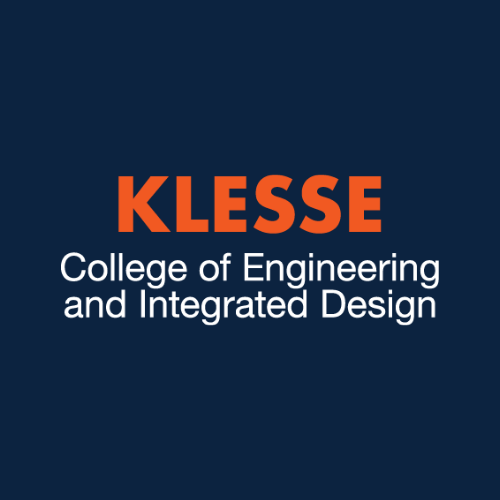Posted on September 27, 2022 by Rory Dew

Klesse College of Engineering and Integrated Design
September 27, 2022 – Three faculty members of the Margie and Bill Klesse College of Engineering and Integrated Design (the Klesse College) were recently named as recipients of grant funding from the National Science Foundation (NSF). Arturo E. Schultz—director of the School of Civil & Environmental Engineering, and Construction Management—and Ibukun Awolusi—assistant professor of construction science and management—will serve as Co-Principal Investigators of the Assembly and Robotics Innovation in Steel Building Erection (ARISE) program. Jiannan Cai—assistant professor of construction science and management—will serve as the Principal Investigator on the Future AI and Robotics for Women in Smart Engineering (FAIR4WISE) project.
ARISE is a multinational research and development initiative designed to evaluate the possible implementation of robotic-aided or led assembly of steel structures utilizing prefabricated elements.
The project, which will receive $1.8 million in NSF grants throughout the 2022 financial year, hopes to create a safer and more commercially efficient construction process. Schultz and Awolusi will work with researchers from New York University and industry members from the United States, Northern Ireland, and the Republic of Ireland to conduct the research program.
“The complex and dynamic nature of the construction work environment increases the safety and ergonomic risks to the workers in steel erection, known for being one of the most hazardous occupations,” Awolusi said. “ARISE capitalizes on advances in innovation and technologies to provide proactive and functional interventions to tackle this critical challenge and enhance the safety performance and efficiency of the construction workforce.”
“Advanced manufacturing technologies such as computer-driven high-definition plasma and waterjet cutting have outpaced the methods used in the steel supply side of building construction” indicates Schultz. “The ARISE project enables the research team to envision these techniques being extended into the realm of automated construction using robotics to assemble steel buildings using innovative intermeshed connections that are fabricated using advanced manufacturing.”
FAIR4WISE looks to improve gender-diversity in what will likely become an increasingly tech-driven construction industry. Forecasts suggest that roughly 49% of current construction jobs will be wholly automated or teleoperated by 2057.
With $551,353 in grant funding from the NSF in the 2022 financial year, Cai and her Co-Principal Investigators—Yuanxiong Guo and Xiaohong Xu from UTSA’s Alvarez College of Business—will develop a framework leveraging AI, robotics and blockchain technologies to support and grow gender-diversity in the construction industry of the future. The three-year, interdisciplinary project will also see collaboration with the University of Tennessee, Knoxville, Penn State University, the University of Houston, and industry partners.
“The FAIR4WISE project will investigate gender differences in collaborating and teleoperating robots, and capitalize on the understandings to develop robot learning and teleoperation methods that are accessible and equitable across genders,” said Cai. “If successful, the developed technology ecosystem will help improve worker productivity, safety, and health, and equip the U.S. workers to lead the way in the construction industry reform in a gender-inclusive manner.”
ARISE and FAIR4WISE were selected as two of 14 ‘Future of Work’ projects sponsored by the NSF. Projects funded by this initiative must demonstrate “potential to enable new methods and technologies that can enhance public health and well-being, increase worker safety, and open rewarding new career paths in fields like heavy construction, education, and transportation.” Funding preference was also given to institutions located in regions that have historically received less federal research funding.
“I am excited to see such impactful research being conducted by our faculty,” said JoAnn Browning, dean of the Klesse College. “The Klesse College is designed to facilitate interdisciplinary collaboration to tackle key issues of today and the future. We are committed to solving grand challenges where humanity intersects with the physical world, be it down the street in San Antonio or around the globe.”
“NSF is catalyzing cutting edge research and innovation across disciplines — where people and technology interact in the workplace,” said NSF Director Sethuraman Panchanathan. “These projects [such as ARISE and FAIR4WISE] are leveraging science and engineering to shape a safer, more equitable future of work with opportunities for all.”
The Klesse College is San Antonio’s leading producer of research and instruction in engineering and design disciplines. Hosting nationally and world-renowned faculty, industry-leading facilities, and curricula developed with a focus on hands-on experiential learning, the college is committed to identifying and solving grand challenges where humanity intersects with the physical world.
UTSA is a Tier One research university and a Hispanic Serving Institution specializing in cyber, health, fundamental futures, and social-economic transformation. With an emphasis on transdisciplinary collaboration, innovation and entrepreneurship, UTSA is leveraging its research and development capabilities to benefit the San Antonio community and the world beyond.
Learn more about the NSF’s Future of Work at the Human-Technology Frontier Project

